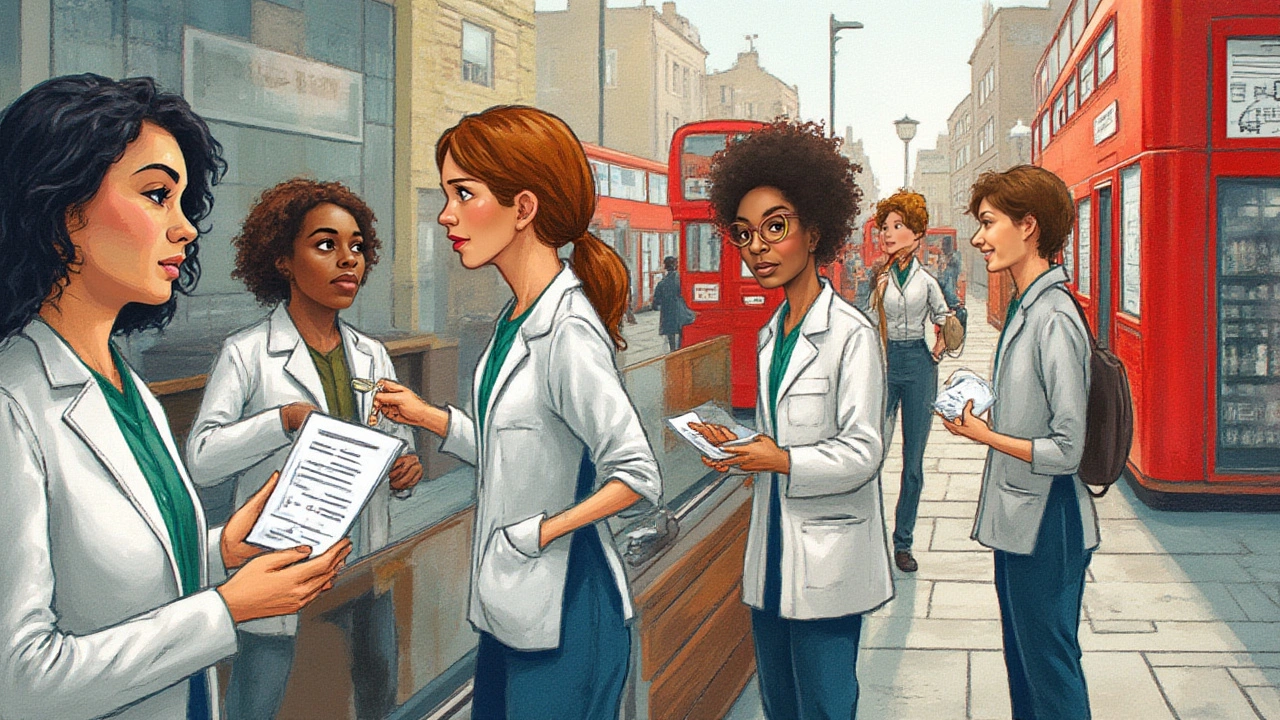Imagine living with diabetes or asthma and visiting your doctor only a handful of times a year. It’s easy to forget, but between those rare appointments, you’re often in charge. Who’s got your back during the everyday grind? The answer might be hiding in plain sight—your local pharmacist. Most people still think of pharmacists as pill counters, yet NHS figures reveal over 4 in 10 people with long-term conditions use pharmacy services for much more. With the relentless rise in chronic illnesses like heart disease, COPD, and diabetes, pharmacists are stepping up in ways that might surprise you.
The Expanding Role of Pharmacists in Chronic Disease Management
Walk into any community pharmacy and you'll notice it’s not just about handing over receipts and tablets anymore. Since the NHS started pushing for more primary care outside of GPs, pharmacists have shifted gears. You’ll now find them delivering full-scale medication reviews, liaising with your doctor, providing blood pressure checks, and even supporting vaccination drives. That’s not just talk from pharmacy chains—it’s reflected in cold, hard numbers. Prescription numbers for long-term conditions soared by 50% in the last two decades across the UK. Pharmacies adapted, offering regular medication reviews—over six million annually, as the NHS reported last year.
These reviews aren’t just ticking boxes. When you come in, the pharmacist dives into your medicine history, checks if you’re taking things correctly, and makes sure there’s no clash between drugs. Accidentally doubling up on a blood thinner or forgetting asthma inhalers happens more than you think. Pharmacies keep a sharp eye on those risks. If they spot an issue, they won’t hesitate to phone your GP or flag it for urgent review. In fact, pharmacists catch medication errors in up to 20% of complex prescriptions, preventing real harm. Communities feel that impact: a study out of Cardiff University found pharmacist reviews stopped hospital admissions for 1 in 25 patients with chronic illnesses.
Support goes past medication. Pharmacists lead smoking cessation clinics, weight management support, and basic diabetes risk screening. During COVID-19, these services ramped up out of necessity, and NHS Scotland invested heavily in pharmacy training. Now, it’s standard for patients to access testing for things like cholesterol or blood glucose in pharmacies, a relief for overbooked GP surgeries. For young families like mine, it means getting advice on childhood asthma without booking a doctor’s slot weeks in advance.
| Chronic Disease | Role of Pharmacist | Key Service | UK Patients Supported (Yearly) |
|---|---|---|---|
| Type 2 Diabetes | Medication review, lifestyle coaching | Glucose testing, weight support | 3,900,000 |
| Asthma/COPD | Inhaler checks, device training | Breath tests, peak flow reviews | 5,400,000 |
| Heart Disease | Blood pressure management | BP checks, cholesterol screening | 7,000,000 |
| Hypertension | Medication adherence | Pill reminders, blood pressure checks | 15,000,000 |
The shift didn’t happen overnight. Policy changes nudged pharmacists into clinical spaces, while digital health tools allowed them to track patient progress. Repeat prescription services and text reminders, now a fixture in many UK pharmacies, boost treatment success. We’re seeing a new wave of highly trained pharmacist prescribers, over 10,000 and counting, offering a hands-on approach for patients who need it most.

Everyday Ways Pharmacists Empower Patients
It’s a Monday morning and you realise you’re nearly out of statins or asthma inhaler. Instead of scrambling for an urgent GP appointment, you walk to your local pharmacy. Here’s where the real magic happens—pharmacists are trained to handle a lot more than most folks ever use them for. For chronic disease, self-management is the game, and the pharmacy team is your coach in the background: no judgment, just practical help.
One of the biggest weapons in a pharmacist’s toolkit is the Medicines Use Review (MUR). During these short chats, you get personalised tips for using your medication properly, flagging up side effects that might be quietly ruining your day, or identifying gaps in how you take your meds. Statistically, nearly 30% of people prescribed new drugs for long-term conditions don’t take them as prescribed in the first three months. Pharmacists catch these hiccups, helping you stick with your treatment plan. The difference this makes is huge—in one NHS pilot, regular check-ins boosted medication adherence by 40% and cut hospital stays for chronic condition patients by half.
Education is another cornerstone. Pharmacists can break down complicated medical lingo in plain English—no judgment if you forget what your GP told you about sodium levels or kidney numbers. They are often the first stop when new guidelines roll out. For example, when new blood pressure targets were set a few years back, pharmacists were at the frontlines explaining why your ‘old normal’ reading was no longer safe enough.
If you have elderly parents or a busy household (like mine—Ezra has his own opinions on bedtime and medicine), pharmacists can help set up pill organisers or explain dosing calendars. They give practical lifestyle advice: what time of day to take certain tablets, foods that interfere with meds, and even what over-the-counter cold relief is safe with your prescriptions. A lot of people don’t realise that over half of all hospital admissions from medication issues are actually preventable, and a sharp-eyed pharmacy team is your best bet at dodging problems.
Don’t forget about minor illness management. When something flares up—say your arthritis gets worse during the winter—your pharmacist can suggest effective self-care, assess if you need to see a doctor, and sometimes even prescribe a short course of medication. Over 85% of patients who get same-day help from community pharmacists rate the support as ‘very good’ or ‘excellent’ according to the most recent NHS surveys.
- Struggling to remember your daily pill routine? Your pharmacist can print an easy-to-follow schedule.
- If you have side effects but feel awkward raising them with your GP, bring them up at the pharmacy—even small bruises or upset stomachs matter.
- Ask about Electronic Repeat Dispensing if you’re fed up calling your GP for every renewal. Your pharmacy can sort the next six or twelve months in one go.
- Try blood pressure or cholesterol checks in-store, especially if GP appointments are fully booked.
- Need help quitting smoking or improving your diet? Most NHS pharmacies offer tailored coaching once a week or more.
Practical, approachable, and always right around the corner, your pharmacist’s role in managing *chronic disease* is bigger than most expect. They’ve become the go-to for advice that sits right in that sweet spot: expert but never out of touch with real life.

Why Strong Pharmacies Matter in Public Health
Chronic disease is an endless story, and the NHS is feeling the squeeze. One in three adults in the UK lives with at least one long-term condition, and the numbers climb every year. GP surgeries are swamped, A&Es are overflowing, and health budgets are always tight. That’s where strong, well-staffed pharmacies pick up the slack.
The stats are impossible to ignore. NHS Digital reported pharmacy consultations topped 1.2 million per week in 2024, often saving patients lengthy commutes or weeks of waiting for doctor appointments. Close to half of these visits relate to long-term conditions that would otherwise burden the GP system. The new Pharmacy First scheme in England, started in early 2024, is betting big on this trend: pharmacists can now treat seven common conditions without a prescription or GP referral. Pilot programmes in Manchester and Scotland show that up to 70% of cases managed under this scheme resolved without anyone needing to see a doctor at all.
Another game-changer? Digital connectivity. With patient records now accessible by many pharmacists (including Scotland’s community pharmacy digital links since 2023), pharmacists have all the history they need to make smart calls quickly. For those living in rural towns or with mobility issues, this can mean the difference between spotting a brewing flare-up early—like badly controlled asthma—or ending up in hospital from a preventable crisis.
Pharmacies anchor their communities, too. Rural pharmacies have become lifelines for isolated patients managing multiple prescriptions or juggling several conditions. Research by the Royal Pharmaceutical Society found that people in deprived areas use pharmacies up to twice as much as people in affluent zones—a sign that easy access and no appointment barriers work, especially when travel to clinics isn’t an option.
There are still big hurdles. The workforce is stretched, funding pressures remain, and the average pharmacist appointment is just a few minutes (compared to 10 or 15 for GPs). Not every ailment can be managed at the counter. But pharmacists are pushing for more rights to prescribe across Scotland, Wales, and England. The NHS’s 2024 plan hinted at giving pharmacists an even bigger say in routine monitoring and managing stable cases. Imagine never waiting for a re-referral just to get your blood pressure checked or to renew a simple repeat script.
For anyone living with a chronic illness—or caring for someone who does—the key takeaway is simple: use your pharmacist. Keep them in the loop about any new symptoms, bring in all your medicine bottles for an annual review, and don’t ignore their advice on self-care or local resources. The *pharmacists UK* have your back, and the tools and training to keep you as healthy as possible for the long haul. Next time you pop in for your prescription, remember: you’re not just ticking a box—you’re tapping into some of the most hands-on, practical support the NHS offers.



Comments (10)
Nathaniel Petrovick July 18 2025
Pharmacists really are unsung heroes when it comes to managing chronic diseases. They don’t just hand out medication and send you on your way. Their medication reviews help catch any potential side effects or interactions early on, saving a lot of hassle and risk down the line.
And it’s not just meds — the lifestyle advice pharmacists offer can be a game changer. Simple changes picked up from a pharmacist’s guidance can relieve symptoms or even slow disease progression. I feel like sometimes this role is overlooked in favor of doctors but it’s just as vital.
In the UK, where the health system can be pretty stretched, having pharmacists support long-term health management seems like a smart use of resources. The fact they’re more accessible than a doctor is also a huge plus for patients.
Has anyone here had any personal experiences where pharmacists made a real difference in managing a chronic condition? I’m interested in specific stories!
Paul Timms July 19 2025
I can totally agree with you. Pharmacists provide a crucial safety net. Their thorough medication reviews catch mistakes that could be life-threatening.
It’s also their role to educate patients on the medications, ensuring people understand how to take them properly, which sometimes isn’t obvious. This education reduces hospitalizations.
I appreciate how pharmacists advocate for patients by liaising with doctors if adjustments are needed. That team approach ultimately enhances the patient’s care experience.
It would be interesting to see more integrated systems where pharmacists are fully embedded within healthcare teams managing chronic diseases.
Honey Jonson July 22 2025
Yesss to all of this! Pharmacists are like the chill coaches in our health journey. They don’t judge and drop knowledge in such an approachable way sometimes docs can’t.
I love how they remind you of those tiny lifestyle changes like diet tweaks or physical activity that actually add up big time for chronic illness.
Sometimes I think they’re the friendliest healthcare figures you’ll meet. That personal touch makes managing ongoing health stuff less scary.
Plus, they’re right there at the corner shop, making care feel local and accessible.
Jeroen Post July 25 2025
Hmm, I’m not so sure all pharmacists are working purely for patient care. With the influence of big pharma behind the scenes, isn’t there a chance that their advice is sometimes swayed by pharmaceutical interests?
We have to ask if the system prioritizes profit disguised as care. Medication reviews might just be a way to push more prescriptions under the guise of support.
It’s a big conspiracy around chronic disease management being a business model, not just a health mission. Always question the real motivations behind healthcare roles.
Don’t blindly trust — dig deeper and watch for the full picture.
Destiny Brumbaugh July 27 2025
This whole thing about UK pharmacists playing a vital role is great and all but lets not forget the American healthcare system fails miserably in comparison! If we had similar access here, people’s health outcomes would improve for sure.
Encouraging more pharmacist involvement could be a key to solving many chronic illness struggles everywhere, not just in the UK.
Maybe this model should be pushed globally especially where people lack regular doctor visits.
Healthcare needs a shakeup, and pharmacists could be the change agents we all need.
Sally McElroy July 30 2025
One must remember the moral imperative here: pharmacists, as healthcare professionals, bear a sacred duty not only for the pharmacological elements but for encouraging healthful lifestyles as holistic care.
Their interventions contribute to a more morally responsible and compassionate healthcare system, one where patients are empowered and supported beyond the pill dispenser role.
Without moral commitment, chronic disease management risks becoming mere clinical transactions rather than nurturing human health and dignity.
So let us uphold and celebrate their vital, ethical role in health advancement.
Sara Escanciano August 2 2025
It’s frustrating how people underestimate pharmacists. They are frontline warriors. Managing meds is serious, one slip can ruin lives. We need to give them the respect and resources they deserve.
Often, pharmacies are crowded, understaffed, and yet these pharmacists handle it all while being a lifeline for chronic patients.
The system needs to evolve to support them better not just in the UK but everywhere.
Stop overlooking this crucial profession.
Jason Townsend August 4 2025
The whole medical industry is a racket. Sure pharmacists look like they’re helping but it’s a facade. They’re pawns in a corporate game to keep chronic patients dependent, filling pockets of corporations.
Nothing is as simple as it looks. Chronic disease management often masks bigger issues of systemic failure and greed.
Wake up and don’t buy the official narrative. The role described here is just window dressing for deeper control.
Antwan Holder August 14 2025
The drama I see in how pharmacists are sometimes ignored is real. They carry the weight of so much responsibility, often behind the scenes, holding together a healthcare system that can feel so broken.
Think about the emotional labor they invest in chronic disease care — it’s immense, counseling patients through fear, pain, ongoing struggles.
Their role deserves applause, recognition, and better support structurally. Without pharmacists, many patients would feel helpless and lost.
I genuinely hope we start seeing this profession in a whole new light moving forward.
Elmer Burgos August 15 2025
Such an interesting discussion! I really appreciate the balance between skepticism and genuine respect here.
I think pharmacists play a unique bridging role, combining direct patient contact with medical knowledge in a way that doesn’t replace doctors but complements them.
It might be easy to fall into conspiracy thinking but it’s also useful to remain critical and advocate for transparency.
Ultimately, the goal is better patient outcomes, and if pharmacists can help achieve that, supporting them with proper resources and recognition is the way forward.
I’m curious to hear if anyone has thoughts about how pharmacists and doctors can collaborate more effectively in chronic disease management?